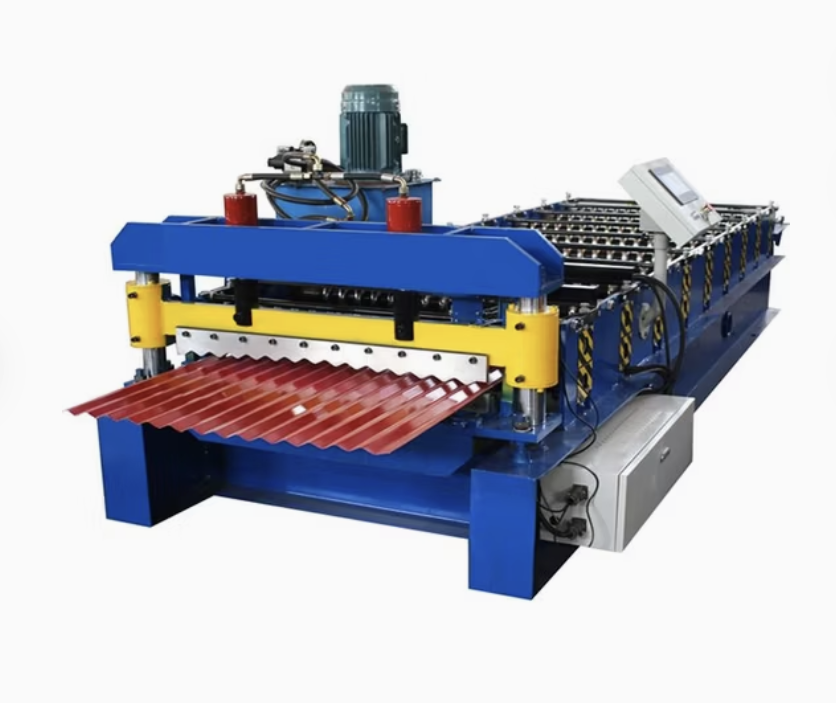To express an interest in this machine please submit the form below.

Not Sure What Machine You Need?
Select Your Profile, We'll Match It
Choose your desired profile drawing, and let Machine Matcher connect you with the best roll forming machine tailored to your needs.
Browse Profiles
Corrugated roll forming machines are essential equipment for producing corrugated metal sheets, widely used in roofing, cladding, and siding applications. Their popularity stems from the durability, versatility, and aesthetic appeal of the corrugated profile. In Ireland, where weather conditions demand robust and long-lasting roofing solutions, these machines cater to a significant market.
This guide delves into the detailed specifications, features, and benefits of corrugated roll forming machines, as well as answers common questions related to their use and purchase in Ireland.
A corrugated roll forming machine is designed to transform metal coils into corrugated sheets of various dimensions and thicknesses. The machine operates using a series of precision rollers that gradually shape the metal sheet into the desired profile. It is known for its high efficiency, consistent quality, and user-friendly operation.
| Feature | Details |
|---|---|
| Raw Material | Galvanized steel, pre-painted steel, aluminum, or stainless steel. |
| Material Thickness | 0.3 mm to 1.2 mm (customizable based on requirements). |
| Roller Stations | 12–20 (depending on the profile). |
| Roller Material | High-grade steel (e.g., 45# steel) with hard chrome coating. |
| Profile Width | 762 mm to 1250 mm (customizable). |
| Forming Speed | 15–20 meters per minute (standard) or up to 30 m/min with upgraded systems. |
| Cutting System | Hydraulic cutting with high-precision blades. |
| Power Supply | 380V, 3-phase, 50Hz (customizable for Irish standards). |
| Control System | PLC (Programmable Logic Controller) with a user-friendly interface. |
| Dimensions | 6m–10m (length) x 1.5m (width) x 1.2m (height) depending on configuration. |
| Weight | Approximately 5–7 tons. |
| Coil Weight Capacity | Up to 5 tons (expandable with heavy-duty uncoilers). |
| Extras | Automatic uncoilers, recoilers, stackers, and safety guards. |
Q1: What types of metal can a corrugated roll forming machine handle?
A: The machine can process galvanized steel, aluminum, pre-painted steel, and stainless steel. Material selection depends on the intended application and budget.
Q2: Is the machine suitable for Irish weather conditions?
A: Yes, corrugated sheets produced by these machines are designed to withstand Ireland’s variable climate, including heavy rain, wind, and snow.
Q3: Can the machine produce customized profiles?
A: Absolutely! Machines can be customized to produce specific dimensions, thicknesses, and profiles to meet unique project requirements.
Q4: How energy-efficient is the machine?
A: Modern machines come with energy-efficient motors and systems, ensuring optimal performance while keeping energy consumption low.
Q5: Are there financing options available for purchasing?
A: Many suppliers in Ireland offer financing or leasing options, making it easier for businesses to acquire these machines.
Q6: How long does it take to install and start production?
A: Installation typically takes 1–2 days, and production can begin immediately after testing and calibration.
Q7: What is the average lifespan of a corrugated roll forming machine?
A: With proper maintenance, these machines can last 10–15 years or more.
Q8: Are spare parts readily available in Ireland?
A: Yes, most suppliers provide spare parts and technical support locally or through quick import channels.
Q9: How can I ensure compliance with Irish building regulations?
A: Work with a supplier experienced in the Irish market and ensure the machine produces profiles that meet local standards.
Q10: What factors should I consider before purchasing?
A: Key factors include material compatibility, machine speed, automation level, budget, and after-sales support.
Copyright 2026 © Machine Matcher.